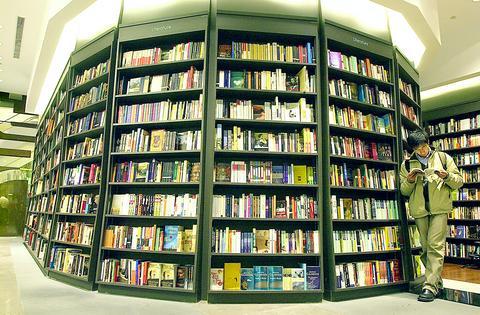A Singapore-based international bookstore has attracted the attention of local rivals with the soft opening this week of what it says is the largest bookstore in Taiwan.
Page One, established in 1983, made its debut in Taiwan on Monday on the fourth floor of the Taipei 101 Mall. With 720 ping of sales area, the company said it aims to become the largest international mega-bookstore in the country.

PHOTO: GEORGE TSORNG, TAIPEI TIMES
"Taiwan is the place with the most vigorous growth in the world in the Chinese-book-trading market," said Dennis Liu (劉春豪), the bookstore's corporate affairs manager.
The Taipei 101 branch is Page One's 11th store, following expansion to Malaysia, Thailand, Hong Kong and Australia.
The company invested about NT$150 million in the new branch, which will stock 170,000 books in Chinese and 160,000 in English. It is particularly proud of the 20,000 books it will offer on art and design.
"Our huge selection of art and design books is our distinguishing feature from the competitors," Liu said. "The estimated 85,000 highly educated office workers in Taipei 101 will be the target customers for our numerous books in English."
Page One hopes to draw 5,000 visitors daily and expects to create sales of NT$35 million in its first year, Liu said.
Some booklovers praised Page One's interior design and ample space, as well as its plentiful supply of books in English.
"The new and big space is comfortable and the abundant selection of books offered can meet consumers' needs," said Sophia Su, a 30 year-old teacher.
Another customer agreed, saying the rest corners and lighted areas made customers feel respected.
"I think it makes the store more appealing than Eslite (
Eslite Co, the nation's largest bookstore chain with 50 outlets, denied Page One's claim of being Taiwan's largest, or even best, bookstore.
"Our flagship store [at the intersection of Jenai Rd. and Tunhua S. Rd.] measures 1,500 ping and has sales of more than NT$40 million per month," said Lee Yu-hwa (
In addition to the ample art and architecture books which draw lots of artists and architects, Eslite in 1999 started operating 24 hours a day at its flagship store, Lee said.
While welcoming the competition, Eslite said it expected to increase sales to NT$5.2 billion this year from NT$4 billion last year and open up to 10 more outlets.
"Our more than 80,000 loyal members that shop at least three times a month, spending an average of NT$1,000 every time, are our valuable asset and competitive edge," she said.

GROWING OWINGS: While Luxembourg and China swapped the top three spots, the US continued to be the largest exposure for Taiwan for the 41st consecutive quarter The US remained the largest debtor nation to Taiwan’s banking sector for the 41st consecutive quarter at the end of September, after local banks’ exposure to the US market rose more than 2 percent from three months earlier, the central bank said. Exposure to the US increased to US$198.896 billion, up US$4.026 billion, or 2.07 percent, from US$194.87 billion in the previous quarter, data released by the central bank showed on Friday. Of the increase, about US$1.4 billion came from banks’ investments in securitized products and interbank loans in the US, while another US$2.6 billion stemmed from trust assets, including mutual funds,

AI TALENT: No financial details were released about the deal, in which top Groq executives, including its CEO, would join Nvidia to help advance the technology Nvidia Corp has agreed to a licensing deal with artificial intelligence (AI) start-up Groq, furthering its investments in companies connected to the AI boom and gaining the right to add a new type of technology to its products. The world’s largest publicly traded company has paid for the right to use Groq’s technology and is to integrate its chip design into future products. Some of the start-up’s executives are leaving to join Nvidia to help with that effort, the companies said. Groq would continue as an independent company with a new chief executive, it said on Wednesday in a post on its Web

JOINT EFFORTS: MediaTek would partner with Denso to develop custom chips to support the car-part specialist company’s driver-assist systems in an expanding market MediaTek Inc (聯發科), the world’s largest mobile phone chip designer, yesterday said it is working closely with Japan’s Denso Corp to build a custom automotive system-on-chip (SoC) solution tailored for advanced driver-assistance systems and cockpit systems, adding another customer to its new application-specific IC (ASIC) business. This effort merges Denso’s automotive-grade safety expertise and deep vehicle integration with MediaTek’s technologies cultivated through the development of Media- Tek’s Dimensity AX, leveraging efficient, high-performance SoCs and artificial intelligence (AI) capabilities to offer a scalable, production-ready platform for next-generation driver assistance, the company said in a statement yesterday. “Through this collaboration, we are bringing two

Even as the US is embarked on a bitter rivalry with China over the deployment of artificial intelligence (AI), Chinese technology is quietly making inroads into the US market. Despite considerable geopolitical tensions, Chinese open-source AI models are winning over a growing number of programmers and companies in the US. These are different from the closed generative AI models that have become household names — ChatGPT-maker OpenAI or Google’s Gemini — whose inner workings are fiercely protected. In contrast, “open” models offered by many Chinese rivals, from Alibaba (阿里巴巴) to DeepSeek (深度求索), allow programmers to customize parts of the software to suit their